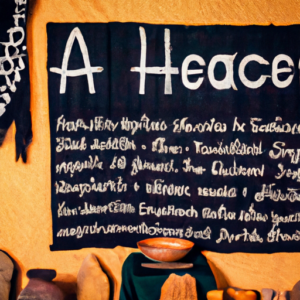– **Survival Skills: Living Off the Land During Warfare**
Introduction
Survival during times of warfare demands more than just physical strength; it requires a deep understanding of the environment and the ability to utilize natural resources. The Apache people, known for their resilience and resourcefulness, have passed down wisdom through generations that can be pivotal in such scenarios. Their survival skills are not just techniques but philosophies that emphasize harmony with nature.
Learning to live off the land as the Apache did involves a combination of knowledge, experience, and respect for the natural world. Their expertise ranges from foraging edible plants and hunting game to building shelters and finding water. Such skills are vital for anyone seeking to sustain themselves when modern resources are scarce or unavailable.
“The land is our mother, we must take care of her.”
This Apache belief underscores the importance of environmental stewardship, especially in survival situations. Embracing these ancient practices not only ensures physical survival but also fosters a deeper connection with the land, providing mental and spiritual resilience during the challenging times of warfare.
History
Throughout history, the Apache people have demonstrated remarkable survival skills, particularly during times of warfare. Their ability to live off the land was rooted in a profound understanding of their environment, enabling them to use natural resources efficiently. This knowledge was passed down through generations and became crucial for sustaining life when faced with the adversities of conflict.
During periods of warfare, Apache warriors employed a variety of techniques to ensure their survival and that of their communities. They developed methods for finding food, water, and shelter in the harsh landscapes of the American Southwest. Hunting, foraging, and the cultivation of native plants were essential components of their strategy to thrive in the challenging conditions of their homeland.
“The land is our life, and we know every plant and animal by name,”
is a saying often attributed to Apache elders, reflecting their intimate connection with the natural world. This deep knowledge was not only practical but also deeply spiritual, reinforcing their resilience and adaptability. The wisdom of the Apache in using the land effectively during warfare continues to be a source of inspiration and learning for modern survival techniques.
An Apache story
The Apache people have long been revered for their ability to thrive in harsh environments, especially during times of conflict. Their survival skills are deeply rooted in a profound understanding of the land and its resources. By observing and learning from nature, they developed techniques that ensured their sustenance and safety.
One of the core principles of Apache survival is minimalism. They carried only what was necessary, allowing them to move quickly and evade enemies. This efficiency extended to their shelters, typically simple structures that could be easily dismantled and reconstructed as they relocated.
“The land is our teacher,” an Apache elder once said, emphasizing the importance of respecting and learning from the natural world.
The Apache diet was diverse and resourceful, consisting of harvested plants, hunted game, and foraged foods. They made extensive use of every part of an animal, ensuring nothing went to waste. Knowledge of edible and medicinal plants was passed down through generations, forming a crucial part of their survival toolkit.
- Edible plants and herbs
- Hunting and trapping techniques
- Water sourcing and purification
In addition to physical skills, the Apache also relied on a profound sense of community and shared responsibility. Everyone played a role in the group’s survival, from children learning essential tasks to elders imparting knowledge and wisdom. This collective approach ensured that skills and traditions were preserved and adapted over time.
Under the vast, cerulean sky of the Apache homeland, Elder Haaska often gathered the children by the ancient, weathered oak. As the fire crackled, casting dancing shadows, Haaska’s voice began to weave its tale.
“In the time of our ancestors, during the great wars with the invaders, survival meant more than skill with a bow. It meant knowing the land and using her gifts,” Haaska said, his eyes glinting like obsidian.
The children leaned closer as he continued. “There was a young warrior named Kangee. He was swift and silent as the mountain cat, but it was his mastery of the land that became his greatest weapon.”
Haaska’s voice lowered, almost a whisper, bringing urgency to his words. “One night, our enemies’ torches moved like fireflies through the canyon. Kangee led his people, not with weapons, but with wisdom. ‘Follow me, and place each foot as I do,’ he instructed.”
As they moved silently, Kangee collected the bounty of the earth. He whispered to the children in the story, “Here, the yucca plant. Slice it, and its fibers become strong cords for traps.” The children nodded, their imaginations weaving visions of strong hands and clever minds at work.
“In another step, he plucked the berries of the juniper. ‘For hunger,’ he said, passing them around.” Haaska smiled, knowing the children could almost taste the tangy sustenance on their tongues.
“Through sagebrush and over limestone they traveled, till they reached the hidden cave. Inside, Kangee gathered wild onions and underground roots. ‘Nature provides,’ he reminded his people as they ate, safe and unseen.”
Haaska paused, allowing the fire’s murmur to underscore the lessons shared. “You see, true strength lies not in confrontation but in the harmony between the warrior and the land. Use your eyes to see what others miss, your hands to craft what the earth provides. This is how our people endured.”
The elder’s gaze swept over the rapt faces. “Kangee’s legacy lives in you. Remember, to survive is not merely to exist but to thrive in unity with all that surrounds you.”
As the embers glowed softly, Ha
Implementing it in your life
Implementing Apache wisdom in your life can provide invaluable survival skills, especially during times of warfare when living off the land may become a necessity. By adopting these tried-and-tested methods, you ensure not only your survival but also a deeper connection with nature. Start by educating yourself on plant identification, animal tracking, and other essential skills that were integral to the Apache way of life.
Practicing these skills regularly will help build muscle memory and mental fortitude. It’s beneficial to start small, perhaps dedicating weekends to learn and practice in a controlled environment. Gradually, you can challenge yourself by simulating scenarios where you need to rely solely on the land for sustenance.
- Learn to identify edible and medicinal plants in your local area.
- Practice building shelters using natural materials found in the environment.
- Develop tracking skills to follow and hunt game animals efficiently.
- Master basic fire-starting techniques without modern tools.
- Learn how to source and purify water from natural sources.
- Study the art of making tools and weapons from available resources.
- Engage in stealth and evasion exercises to enhance your ability to move unseen.
These steps lead to significant personal growth by fostering resilience, adaptability, and self-reliance. As you become more skilled, you will notice a boost in confidence and an increased ability to remain calm under pressure. This prepares you not just for survival situations but also for overcoming everyday challenges with greater ease.
Embracing these practices promotes a closer relationship with the natural world, encouraging a mindful and respectful way of living. Ultimately, blending these ancient techniques into your life enriches your understanding of both yourself and the environment around you.
Conclusion
Drawing on the deep knowledge and resilience of Apache wisdom, mastering survival skills to live off the land during warfare is not just a means of sustenance but a vital approach to autonomy and protection. Understanding the environment, utilizing natural resources, and employing traditional techniques are essential components of survival.
These skills emphasize the importance of preparedness, ingenuity, and respect for nature. By cultivating these practices, individuals can enhance their resilience and adaptability in crisis situations. The Apache people’s legacy of survival offers invaluable lessons for anyone seeking to develop their own capabilities in challenging environments.
As we reflect on these traditional skills, it is crucial to apply and share this knowledge to ensure it is preserved and adapted for future generations. Embrace the principles of self-sufficiency and connection with the land, and commit to learning more about how to thrive amidst adversity.
“Wisdom sits in places.” – An Apache proverb
Let this wisdom guide and inspire you to deepen your understanding of survival skills. Equip yourself and others with the knowledge to not only endure but to flourish, even in the most trying circumstances.
The image and article have been augmented with AI.
Further Study:
- How do Apache spiritual practices influence their concept of wisdom and knowledge?
- What is the significance of the bow and arrow in Apache spiritual symbolism?
- How do Apache spiritual practices influence their approach to conflict and peace?
- How do Apache people incorporate spiritual practices into their approach to art and creativity?
- What is the importance of silence and solitude in Apache spiritual practices?
- How do Apache spiritual practices influence their approach to death and dying?
- How do Apache people incorporate spiritual practices into their approach to sports and physical activities?
Thank you for reading!







